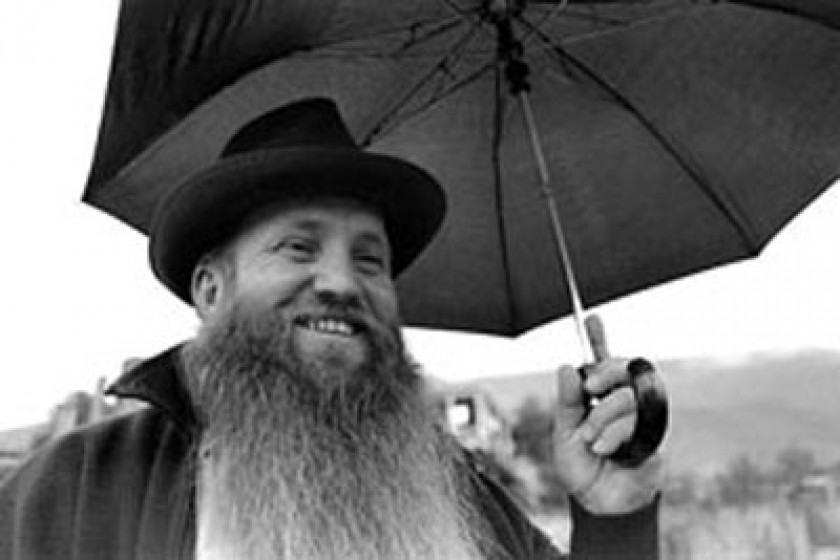
Expelled from the homeland
"We didn't accept their dirty customs, the commandments of their Church. And so they expelled us," 95-year-old Ivan Nikolayevich tells us the story of the Molokans. The residents of the village of Fioletovo in the Lori Marz hold the customs of their ancestors sacred and follow their religious teachings. Because of these teachings, a number of families from the Tambov region of Russia were expelled by Czarina Catherine the Second more than two centuries ago. God guided them towards the Biblical Mount Ararat. The northern region of Armenia appealed to them; they settled here and established a seven-family community. They built houses, began to work the land, and took root themselves in the foreign land.
A commander named Nikitin who was serving in a nearby military unit gave considerable help to the Russians who had been expelled from their homeland. In return, they immortalized him by naming their settlement Nikitin. During the Soviet era, the village was renamed in honor of a revolutionary, Fioletov.
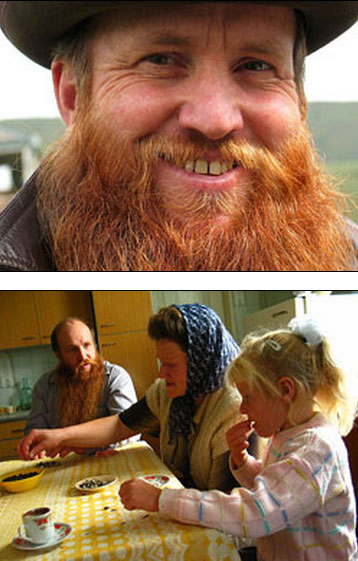 Ivan Nikolayevich was born in Fioletovo. He is a World War II veteran who fought in Kerch as a senior sergeant and was wounded in the arm. The 95-year-old Molokan supported his family by raising cabbage, carrots, and potatoes and selling them to his Armenian neighbors. He raised six children and passed down to them the customs of Postoiannye - the mainstream branch of the Molokan religion. "There are some similarities between ours and the Armenian religion," Ivan Nikolayevich says. "The same Gospel, the same God."
Ivan Nikolayevich was born in Fioletovo. He is a World War II veteran who fought in Kerch as a senior sergeant and was wounded in the arm. The 95-year-old Molokan supported his family by raising cabbage, carrots, and potatoes and selling them to his Armenian neighbors. He raised six children and passed down to them the customs of Postoiannye - the mainstream branch of the Molokan religion. "There are some similarities between ours and the Armenian religion," Ivan Nikolayevich says. "The same Gospel, the same God."
"Spiritual Christians" (Molokans) do not follow the Orthodox Church. Their founder was Semyon Ukleyin; their confession is based on the word of God, and churches, crosses, and icons are just objects made of wood and stone to them. Because they ignored the fast days designated by the Russian Orthodox Church, they were labeled "molokan" ("milk drinkers"). Instead of renouncing the label, the leaders of these Spiritual Christians embraced it with the spin that "Molokan" were "drinkers of the spiritual milk of God". Molokans rejected celibacy, the worship of saints and the cross, rituals, and the divinity of the Tsar and of icons.
The first Molokans who came to Armenia belonged to thePostoiannye (Constant or Steadfast, i.e., unchanged or original) Molokans.
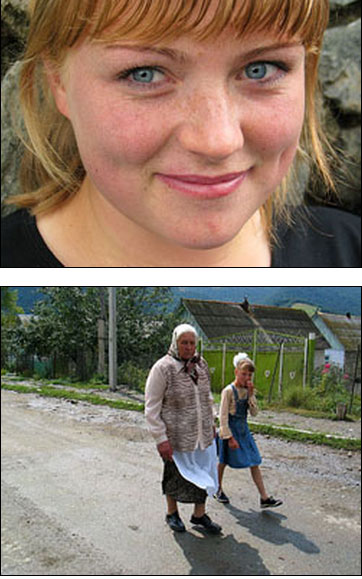 Their holidays are similar to Church holidays. In accordance with the Gospel they celebrate Christmas, Easter, and Remembrance Day. But a Molokan churches, or more properly - gatherings (S obraniia in Russian) look like ordinary buildings, since it is the gathering and not the building that is sacred. Every Sunday they gather to pray, read from the Bible, and sing from a collection of song texts (The Sionskii Pesennik).
Their holidays are similar to Church holidays. In accordance with the Gospel they celebrate Christmas, Easter, and Remembrance Day. But a Molokan churches, or more properly - gatherings (S obraniia in Russian) look like ordinary buildings, since it is the gathering and not the building that is sacred. Every Sunday they gather to pray, read from the Bible, and sing from a collection of song texts (The Sionskii Pesennik).
The other two Molokan branches are closer to one another. The Maximalists are considered uncompromising Molokans; religion is at the heart of their way of life, and there are punishments for deviating from it. The Pryguni(Jumpers, also called Leapers, Skippers, Prancers, or Dancers) believe in the Day of Judgment, and the thousand-year reign of the Lord. Their prayers are accompanied with jumping and prancing. The rituals of these branches differ, and they have different gathering places. Each branch has its leader - the Presviter . The duties of the Presviter may be handed down by right of succession, or the community may elect a Presviter in accordance with the person's righteousness and loyalty to the religious branch.
There are customs that all three branches of Molokans have in common.
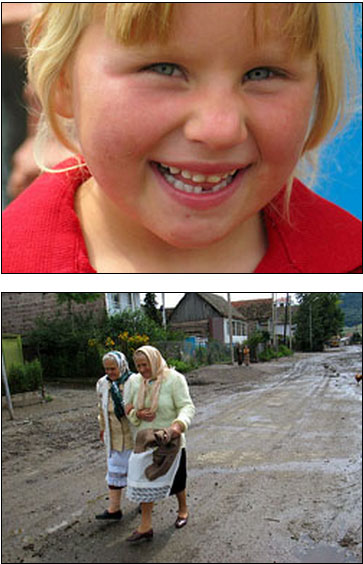 There are customs that all three branches of Molokans have in common. They don't drink, don't smoke, don't commit theft or adultery, and don't watch TV. They don't allow their pictures to be taken. (Only after lengthy negotiations did we manage to get their permission to take some photographs.)
There are customs that all three branches of Molokans have in common. They don't drink, don't smoke, don't commit theft or adultery, and don't watch TV. They don't allow their pictures to be taken. (Only after lengthy negotiations did we manage to get their permission to take some photographs.)
They don't work on the seventh day of the week. Valya Arinina finishes all her housework on Saturday, and greets Sunday with a different appearance and mood. The mother and her daughter wear white aprons and kerchiefs, the men in the family wear their holiday suits, and they visit their friends or prepare for guests themselves. They serve holiday meals - Russian Borscht and noodles. Molokans consider it sinful to eat pork.
52-year-old Valya was brought here from Russia . by her husband. She came and organized the village postal service, and has headed the village post office for more than ten years now. She is not, however, happy with the state of things in her work. She complains that the telephone lines need renovation, the telephones don't work, and it is impossible to call Vanadzor, let alone Russia or other countries. She likes Armenia and Armenians. She grows cabbage, carrots and potatoes and sells them to Armenians.
 During Soviet times, in addition to farming, the Molokans here used to work at the local garment factory and in road-building enterprises. Now their main source of income is growing vegetables and raising cattle. Children help the adults, working in the fields and vegetable gardens. They transport their harvest to Vanadzor on the bus of a neighbor, Moisey. The bus is in Vanadzor by nine o'clock in the morning, and returns to the village by two in the afternoon. Four hours is enough time for the Molokans to sell or exchange their produce, buy whatever they need, and take their "dear bus" back to Fioletovo.
During Soviet times, in addition to farming, the Molokans here used to work at the local garment factory and in road-building enterprises. Now their main source of income is growing vegetables and raising cattle. Children help the adults, working in the fields and vegetable gardens. They transport their harvest to Vanadzor on the bus of a neighbor, Moisey. The bus is in Vanadzor by nine o'clock in the morning, and returns to the village by two in the afternoon. Four hours is enough time for the Molokans to sell or exchange their produce, buy whatever they need, and take their "dear bus" back to Fioletovo.
"I have an individual approach to everyone; every one's problem is my problem," Moisey says. He supports his wife and two children by driving the bus and raising vegetables. He inherited the Maximalist tradition from his parents, but he doesn't wish to talk about it. He only notes that he follows the Gospel and believes in the true God.
"I was born a Maximalist and have no intention of changing my beliefs. But my children will decide for themselves which branch to follow," he says. If he were able to persuade his family, Moisey would move to Russia tomorrow, though he has never lived there, because he is concerned about his children's education.
Higher education is inaccessible to Molokans in Armenia
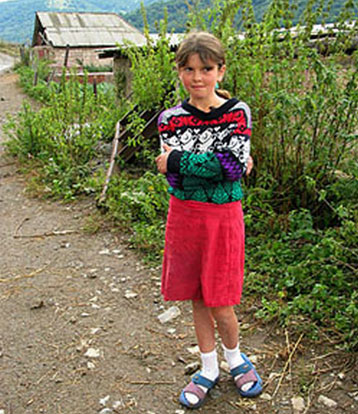 "The school is not good, and the teachers are not our own-it's not important to them that our children learn. I know Armenian because I mix with them. The young men who return from the Army understand and speak Armenian, too, but the new generation doesn't," Moisey complains. Their poor of knowledge of Armenian creates problems for the Molokans, and makes getting higher education impossible.
"The school is not good, and the teachers are not our own-it's not important to them that our children learn. I know Armenian because I mix with them. The young men who return from the Army understand and speak Armenian, too, but the new generation doesn't," Moisey complains. Their poor of knowledge of Armenian creates problems for the Molokans, and makes getting higher education impossible.
13-year-old Kolya Rudametkin doesn't speak Armenian. He says that he likes Armenian; they study it in the school but not thoroughly. He wants to become a qualified professional, but has no idea where to continue his education once he graduates from school. Kolya has chosen his father's path and hopes to become a machine-operator. He likes his school and his teachers.
There are 228 students in Fioletovo's only school. Most of them are Armenian; only one of them is Russian, and was educated in Russia.
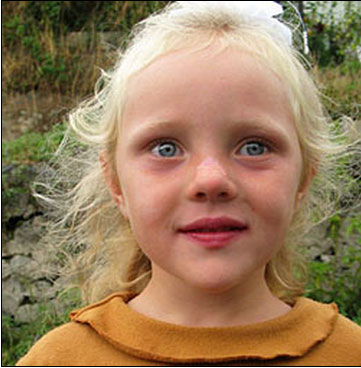 According to the deputy village mayor, Ararat Virabyan, during the Soviet era, although most Molokans who went on to receive higher education did so in Russia , there were a few who studied in Armenia as well. But since independence, none of them has gone on to higher education in Armenia.
According to the deputy village mayor, Ararat Virabyan, during the Soviet era, although most Molokans who went on to receive higher education did so in Russia , there were a few who studied in Armenia as well. But since independence, none of them has gone on to higher education in Armenia.
When they graduate from school, young people become preoccupied with everyday life. Boys work in the fields, and girls do housework, shop, and await marriage.
Molokan holidays
A Molokan wedding is celebrated in accordance with tradition - without liquor, but with tea and special dishes. The best man and maid of honor must be married. The bride wears a white dress and a hat decorated with beads called chupik . The bride gives a white handkerchief to the groom and her parents give him a basket full of sweets as a token of their agreement. Molokans don't give each other golden things. Instead the bride's parents give a rich dowry. There are no customs related to the virginity of the bride. The leader of the branch that the bride and groom belong to blesses the union.
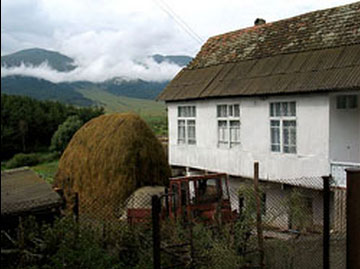 Once a Molokan is married, there is no way out. Marriage is for life; whoever breaks the wedding vows will be despised and rejected by the community.
Once a Molokan is married, there is no way out. Marriage is for life; whoever breaks the wedding vows will be despised and rejected by the community.
No one can come to the wedding without an invitation. When we asked to be present and take some pictures at the wedding ceremony, the bride turned our request down. The relatives explained to us that the newlyweds belonged to different currents and they wished to avoid any additional talk, despite the fact that marriages between followers of different currents are not forbidden.
Marriage to outsiders is a different matter. Molokans aren't supposed to mix blood with Armenians, although there have been such marriages in the history of Fioletovo.
Zhenya Telegina was born in Djermuk. She met her future husband at the hospital where she worked. The Molokan husband married the Armenian woman on the condition that she accept his religion. The 52-year-old woman belongs to the Pryguni branch. Her husband died eleven years ago, leaving his wife without children. Molokans consider her a "super Armenian" and like to say, "She came to live in our village and calls us to order." Zhenya makes her living by running her own small store, and by selling sauerkraut, the secret of which she learned from the Molokans, mainly in Yerevan . Zhenya constitutes a minority within a minority, and often rebels against custom.
"They do everything in secret. They preach that it is forbidden to drink, to smoke, to commit adultery, to gossip, but they do things that make you ask why you should be a follower if you commit such sins. They preach that you should forgive but they don't forgive. Their young girls can gad about the streets all night long and then get honorably married. They can despise a person all his life and expel him from the community, and at the same time they preach that God forgives every one," says Zhenya. Although she follows the ideology of the Pryguni, she considers it a formality, and does not take part in the gatherings.
In September alone, the Pryguni celebrate three holidays. One of these is Remembrance Day, on which they visit the grave of a loved one the first time since the funeral. The second holiday is the Day of Absolution, and the third is the Day of Listening to God's Word.
"They preserve their culture," Zhenya Telegina says of her neighbors. There are presently 585 households in Fioletovo. They are seen as hard-working people who pay taxes on time and don't like to be in debt.
"The word of our ancestors is law for us," says the oldest man in the village. "They told us to live here and that means that we must keep living on this land. This is our land."
Photos by Onnik Krikoryan
 Videos
Videos Photos
Photos
Write a comment